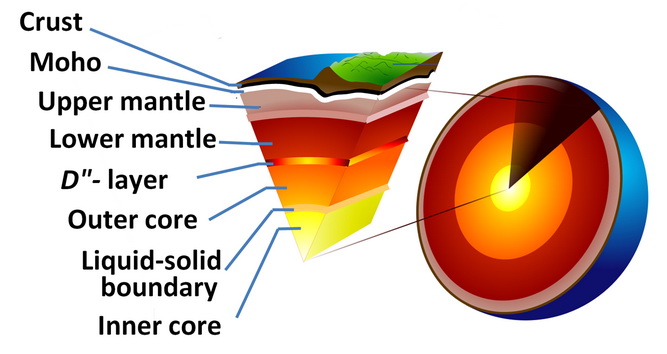And what causes these massive intraplate rupturings? Something deep within the Earth. More than that we don't know.
这种跨板块大地震是怎么发生的?原因在地球深处。更多的情况我们就不知道了。
By the 1960s scientists had grown sufficiently frustrated by how little they understood of the Earth's interior that they decided to try to do something about it. Specifically, they got the idea to drill through the ocean floor (the continental crust was too thick) to the Moho discontinuity and to extract a piece of the Earth's mantle for examination at leisure. The thinking was that if they could understand the nature of the rocks inside the Earth, they might begin to understand how they interacted, and thus possibly be able to predict earthquakes and other unwelcome events.
到20世纪60年代,科学家们对地球内部的事儿了解得太少,觉得很伤心,因此决心要采取一点措施。具体来说,他们想在海床上(大陆上的地壳太厚)钻个孔,一直钻到莫霍面,取出一块地幔样品来慢慢研究。他们认为,只要能搞清地球内部岩石的性质,也许就能开始了解它们的相互作用,从而能预测地震和其他不受欢迎的事件。

The project became known, all but inevitably, as the Mohole and it was pretty well disastrous. The hope was to lower a drill through 14,000 feet of Pacific Ocean water off the coast of Mexico and drill some 17,000 feet through relatively thin crustal rock. Drilling from a ship in open waters is, in the words of one oceanographer, "like trying to drill a hole in the sidewalks of New York from atop the Empire State Building using a strand of spaghetti." Every attempt ended in failure. The deepest they penetrated was only about 600 feet. The Mohole became known as the No Hole. In 1966, exasperated with ever-rising costs and no results, Congress killed the project.
这个项目几乎肯定会被命名为“莫霍钻探”,它简直是灾难性的。他们希望把钻头伸进墨西哥近海4000多米深的太平洋海水,然后再往下钻5000多米,穿透比较薄的地壳岩石。从外海的一条船上搞钻探,用一位海洋学家的话来说,“就像试图从帝国大厦顶上用一根意大利式细面条在纽约的人行道上钻个孔”。一切努力都以失败告终。他们充其量只深入到大约180米的地方。莫霍钻探最后被称之为“无法钻探”。1966年,由于成本不断上升,不见成果,国会又气又恼,取消了这个项目。
来源:可可英语 //www.utensil-race.com/Article/201709/525651.shtml












